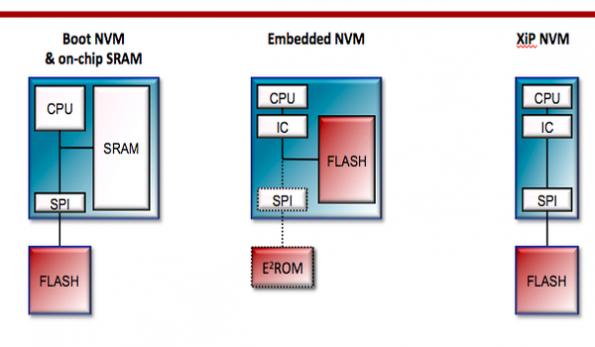



Feature Story
More feature stories by year:
2024
2023
2022
2021
2020
2019
2018
2017
2016
2015
2014
2013
2012
2011
2010
2009
2008
2007
2006
2005
2004
2003
2002
2001
2000
1999
1998
 Return to: 2016 Feature Stories
Return to: 2016 Feature Stories
CLIENT: ADESTO
Sept. 27, 2016: EE Times Europe

Adesto Technologies Corp. (Santa Clara, Calif.) has introduced EcoXiP, an execute-in-place (XiP) flash non-volatile memory (NVM) with features and trade offs selected to suit microcontrollers in many IoT and wearables applications.
Execute-in-place can be used where insufficient on-chip flash is available and instead of on-chip SRAM which would have to load in pages of program memory from non-volatile storage. Adesto also argues that by using a low-cost but high density flash process for the memory and a simpler CMOS for the logic it is possible to produce tuned performance and scalablity without requiring logic respins.
However, execute-in-place has had issues over speed of transfer over SPI and power consumption that Adesto has attempted to address. As a result Adesto's EcoXiP more than doubles processor performance, lowers system power consumption and reduces system cost compared to standard serial peripheral interface (SPI) devices.
Samples of Adesto's EcoXiP are available to lead customers now. Adesto is sampling a 32Mbit device at introduction, with a family of densities up to 128Mbit planned for the future.
The steps Adesto has taken are to add a command to the SPI protocol to allow multiple 16byte cache lines to be fetched in response to that one command. The result on a typical 266MHz clocked CPU with a 4 percent cache miss rate and operating over an 8-wire OPI bus (Octal SPI) is a 41 percent speed up in the processor speed, said Adesto.
For existing memory controllers and MCUs that follow the SPI standard this speed up is not available but Gideon Intrater, CTO of Adesto, told EE Times Europe that the company has been working with ten MCU suppliers including market leader NXP and IP provider Synopsys to support this feature.
SPI host controllers for EcoXiP are available from Adesto IP partners including Mobiveil and Synopsys.
The speed up enabled will also reduce power consumption by allowing the CPU to go back to sleep mode sooner. But to address power consumption over the OPI Adesto has provided programmable I/O drivers. Configurable strength IO pins from 1pF to 15pF reduces the power consumed during read operations and allows I/O to be driven at higher frequencies. This is particularly relevant where the XiP is delivered in the form of a known good die (KGD) for inclusion in a single package.
A final change is to provide configurable banking of memory within the device. This is useful for circumstances where program code needs to be updated over-the-air. Writing is a lengthy process in flash and can take a memory out of action for milliseconds up to a second. For applications where downtime is unacceptable the established method is to use two or more flash memories to hold factory code, the current version and previous version. In this way the device can operate from memory A while a replacement version of the software is loaded into memory B. This comes with additional BOM cost and PCB area. Banking within the single die allows this to be done in a single chip.
"EcoXiP is designed from the ground-up to be the ultimate solution for serving as the main program memory in an intelligent IoT system," said Narbeh Derhacobian, CEO of Adesto, in a statement. EcoXiP delivers 2.4X CPU performance compared to existing quad devices and 1.4X CPU performance compared to best-in-class octal devices.
"The high performance and concurrent read/write capability of Adesto's EcoXIP memories have the potential to dramatically impact the customer experience for IoT and industrial applications," said Emmanuel Sambuis, vice president at NXP Semiconductors, in the same statement. "The NXP MCU and i.MX products will support this differentiated technology through an enhanced memory controller, enabling customers to take full advantage of these memories."
The EcoXiP memory is designed in a 65nm flash-only process and manufactured for Adesto by a foundry. Intrater declined to provide pricing information except to say the initial 32Mbit memory would be a sub-dollar device.
Return to: 2016 Feature Stories